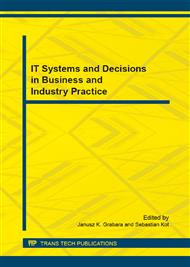[1]
J. Kisielnicki, Systemy informatyczne zarządzania, Warszawa, Placet (2013).
Google Scholar
[2]
S. Brzeziński, J. Grabara, P. Pietrasieński, Concept of Sustainable Development as an Opportunity for Energy Sector in Poland, Metalurgia International 18 (11), (2013).
Google Scholar
[3]
W. Wieczerzycki, E-logistyka, Warszawa, PWE (2013).
Google Scholar
[4]
P. Bajdor, Comparison Between sustainable Development Concept and Green Logistics – the Literature Review, Polish Journal of Management Studies, Vol. 5 (2012).
Google Scholar
[5]
S. Kot, B. Ślusarczyk, Process Simulation in Supply Chain Using Logware Software, Annales Universitatis Apulensis Series Oeconomica, 11(2) (2009).
DOI: 10.29302/oeconomica.2009.11.2.37
Google Scholar
[6]
P. Bajdor, A. Ulfik, S. Nowak, The Selected Aspects of Sustainable Development in Supply Chain Management (SCM), Applied Mechanics and Materials, Vol. 708 (2014).
DOI: 10.4028/www.scientific.net/amm.708.3
Google Scholar
[7]
C. Rosik-Dulewska, Podstawy gospodarki odpadami, Warszawa, Wydawnictwo Naukowe PWN (2010).
Google Scholar
[8]
J. Szołtysek, Logistyka zwrotna, Instytut Logistyki i Magazynowania, Poznań (2009).
Google Scholar
[9]
S. Kot, B. Ślusarczyk, Aspects of Logistics in Biomass Supply for Energy Production, Applied Mechanics and Materials, Vol. 309 (2013).
DOI: 10.4028/www.scientific.net/amm.309.206
Google Scholar
[10]
A. Kryński, M. Kramer, A. F. Caekelbergh, Zintegrowane zarządzanie środowiskiem. Systemowe zależności między polityką, prawem, zarządzaniem i techniką, Wolters Kluwer SA, Warszawa (2013).
Google Scholar
[11]
http: /sios. pl.
Google Scholar
[12]
I. C. Dima, J. Grabara, V. Modrak, Location and importance of logistics in the company's organisational structure, Polish Journal of Management Studies, Vol. 1 (2010).
Google Scholar
[13]
P. Bajdor, J. K. Grabara, Logistics waste management in Czestochowa city, ALS, Advanced Logistic Systems, Vol. 7 No. 1 (2013).
Google Scholar
[14]
J. Papińska-Kacperek, Usługi cyfrowe. Perspektywy wdrożenia i akceptacji cyfrowych usług administracji publicznej w Polsce, Wydawnictwo Uniwersytetu Łódzkiego, Łódź (2013).
DOI: 10.18778/7525-942-1
Google Scholar


